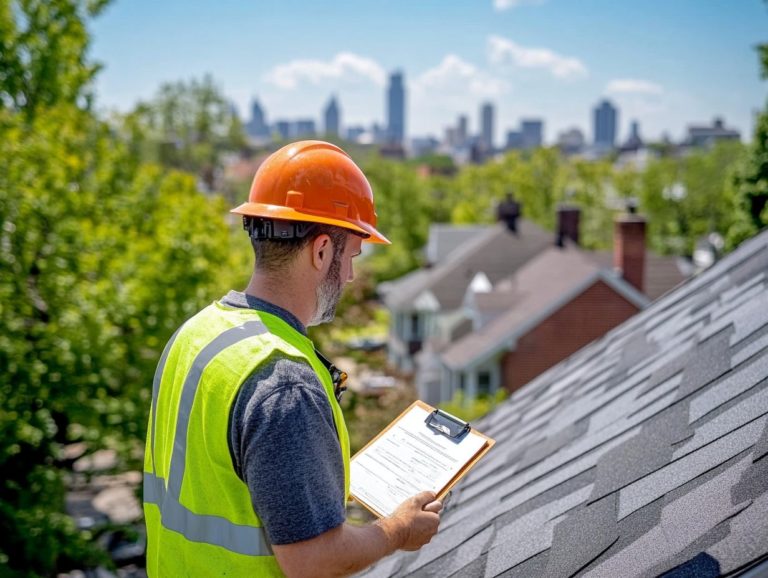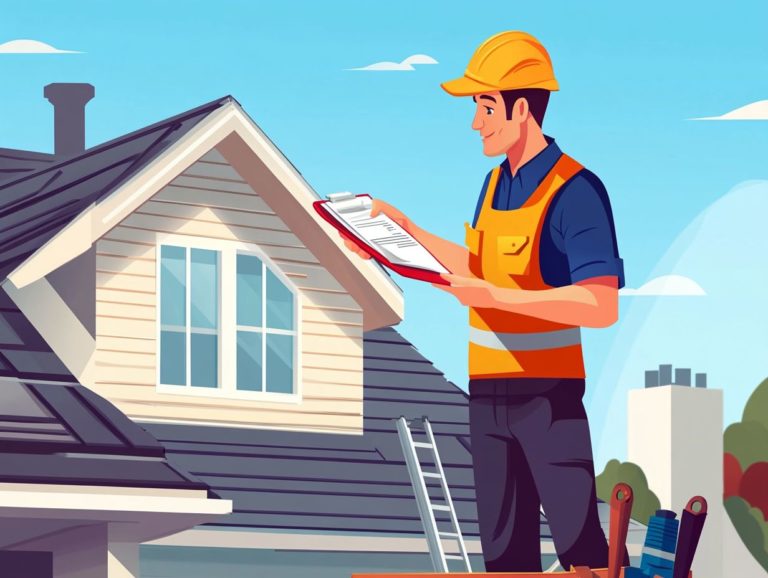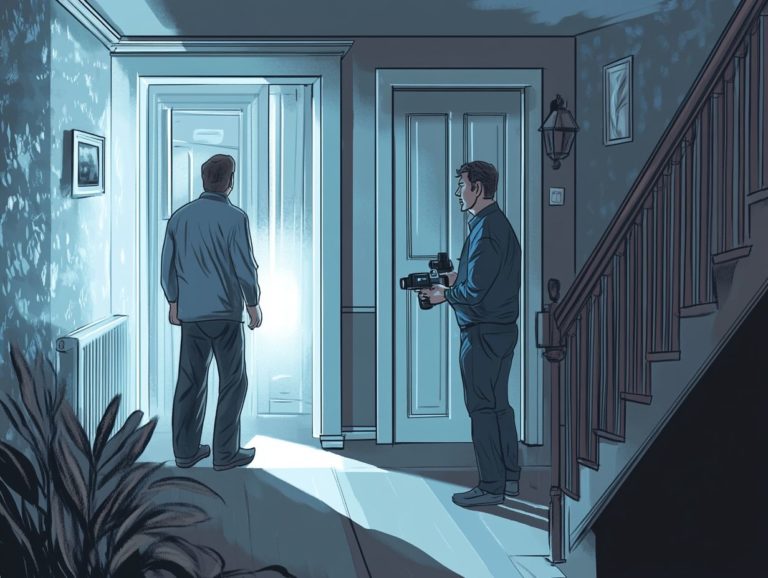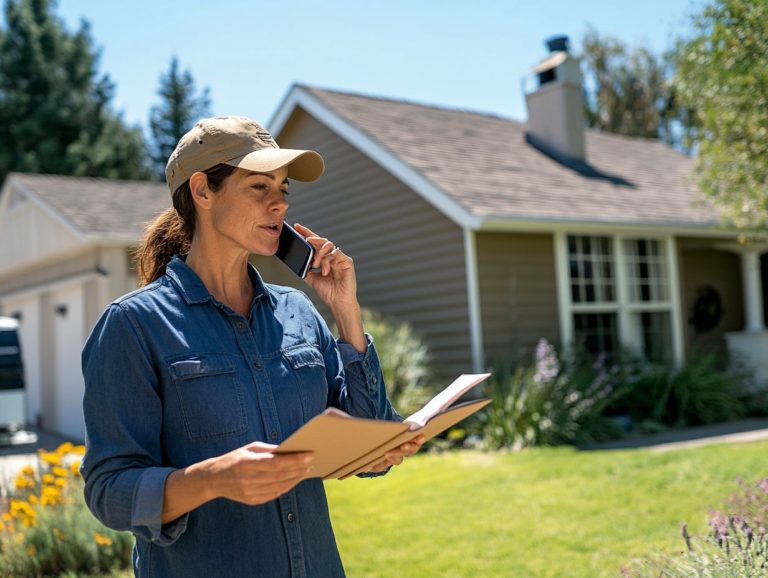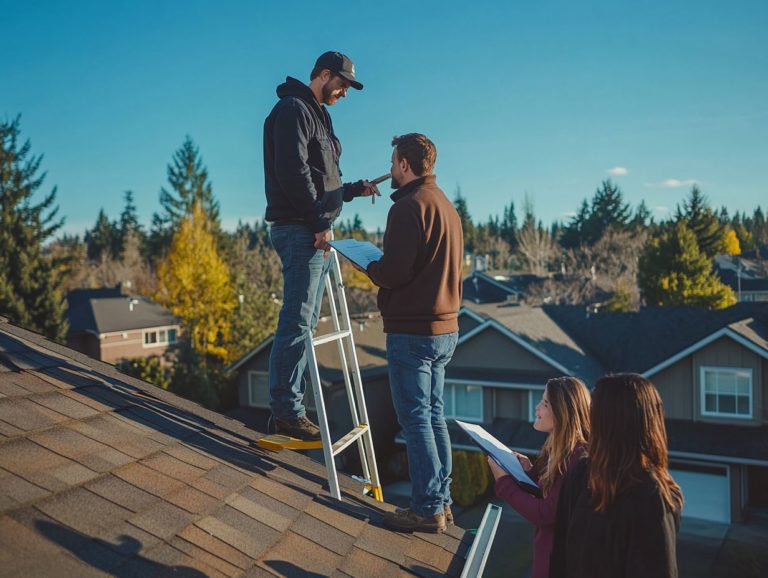How to Choose a Home Inspector in Your Area
When you’re buying or selling a home, selecting a qualified home inspector is an essential step that can profoundly influence your investment.
A comprehensive home inspection can reveal hidden issues, giving you either peace of mind or an edge in negotiations. Explore the importance of home inspections, the key qualities to look for in an inspector, and the vital questions to ask during your consultations.
You’ll also find valuable guidance on comparing quotes, understanding costs, and preparing for a successful inspection experience.
Immerse yourself in this information to make informed decisions throughout your real estate journey!
Contents
- Key Takeaways:
- Importance of Choosing a Qualified Home Inspector
- Qualities to Look for in a Home Inspector
- Questions to Ask Potential Home Inspectors
- Comparing Quotes and Services
- Preparing for the Home Inspection
- Frequently Asked Questions
- What qualifications should I look for in a home inspector?
- What should I ask a potential home inspector before hiring them?
- Is it necessary to use a home inspector that is recommended by my real estate agent?
- What will I find in a home inspection report?
- What should be included in a home inspection report?
- How long does a home inspection typically take?
- Can I attend the home inspection?
- Is it necessary to use a home inspector that is recommended by my real estate agent?
- What other questions should I ask a home inspector?
Key Takeaways:

- Choose a qualified home inspector to ensure a thorough and accurate assessment of your potential home.
- When hiring a home inspector, consider their certifications, experience, reputation, and references to make an informed decision.
- Prepare for the home inspection by asking potential inspectors about their process and understanding the cost and services included in their quote.
Importance of Choosing a Qualified Home Inspector
Selecting a qualified home inspector is vital for you as a home buyer navigating the complexities of the buying process. Knowing how to choose a home inspector ensures that you make well-informed decisions regarding your potential investment.
A certified inspector provides expert analysis that can uncover hidden issues and problems with the structure that might easily escape your notice. By engaging a qualified inspector, you gain insights into property problems like mold and pest infestations, along with a comprehensive inspection that results in a detailed report.
This process is essential in real estate transactions. It significantly influences your ability to negotiate and move forward with confidence in your purchase.
Why a Home Inspection is Crucial
A home inspection is essential for you as a home buyer because it reveals potential property issues that could lead to expensive repairs down the line.
By hiring a qualified home inspector, you can uncover various hidden problems that might otherwise slip under your radar. These professionals take a close look at everything from mold infestations that pose serious health risks to HVAC system malfunctions that could leave you shivering in discomfort.
Plumbing concerns, like pesky leaks or outdated pipes, receive careful scrutiny. Structural defects such as foundation cracks can seriously jeopardize the overall integrity of your new home.
The inspector compiles all these findings into a detailed report, giving you a thorough understanding of the property’s condition. This information is invaluable; it helps you make smart choices, potentially negotiate repairs, and ultimately ensures that your investment is as sound as it can be.
Qualities to Look for in a Home Inspector
When choosing a home inspector, you should prioritize qualities like certifications, reputation, and experience by following this guide on how to choose the best home inspector near you to ensure you receive exceptional inspection services tailored specifically to your needs.
A qualified inspector will possess relevant certifications from respected organizations, such as the American Society of Home Inspectors or the International Association of Certified Home Inspectors, which demonstrate their expertise in evaluating property conditions.
A strong reputation supported by positive reviews and references especially from platforms like the Better Business Bureau and Angi can provide you with the peace of mind you need as a home buyer seeking to make informed decisions.
Certifications and Experience
Certifications and experience are essential elements that distinguish a qualified home inspector, so it’s important to know how to choose the right inspector for your home to ensure you receive a thorough analysis of your property’s condition.
Organizations such as the American Society of Home Inspectors (ASHI) and the International Association of Certified Home Inspectors (InterNACHI) offer valuable certifications that enhance an inspector’s credibility. These certifications demand passing rigorous exams and adhering to strict ethical standards, providing you with the assurance that you re getting trustworthy assessments.
Hands-on experience is crucial in an inspector’s ability to identify both common and hidden issues that an untrained eye might easily miss. This expertise influences the accuracy of the inspection and shapes future recommendations, ultimately delivering peace of mind to you as a prospective homeowner.
Don t wait choose your inspector today for peace of mind!
Questions to Ask Potential Home Inspectors
When evaluating potential home inspectors, it’s crucial to ask the right questions. This ensures you fully grasp the inspection process and understand how to choose an inspector for your home and what to expect from their services.
Engaging with a home inspector allows you to delve into their qualifications. It’s also important to understand how to choose the right inspector for your needs and the thorough methods they employ during inspections, along with the detailed reports they provide afterward.
Inquire about their experience with common property issues, such as mold and pest infestations. This knowledge can significantly influence the recommendations they offer during the inspection.
What to Ask During the Initial Consultation

During your initial consultation with a home inspector, it’s essential to ask specific questions that illuminate the inspection process and the inspector’s qualifications.
It’s important to understand the inspector’s background, so don’t hesitate to inquire about their certifications and the length of their experience in the field.
Delving into their inspection techniques can offer valuable insights into their thoroughness and attention to detail.
Discuss how the inspector handles unexpected issues that may arise during the inspection. This can reveal their problem-solving abilities and adaptability.
By asking about the tools they utilize, the various types of inspections they perform, and their reporting style, you can ensure that you are entrusting your future home to a capable and experienced professional. For more guidance, check out this resource on how to choose the right home inspector for your property.
Specific Questions to Ask About the Inspection Process
Specific questions about the inspection process can arm you with invaluable insights into what to anticipate from your home inspector, ensuring a thorough examination of the property.
- What specific areas will be scrutinized like the foundation, roofs, and electrical systems?
- How does the inspector tackle common issues such as structural problems or mold infestations?
- What is the inspector’s methodology for evaluating these concerns?
- How will findings be communicated in the final report through verbal explanations, photos, or detailed documentation?
Understanding these aspects is essential for enabling you to make informed decisions.
Comparing Quotes and Services
Comparing quotes helps you understand inspection costs and discover what each inspector brings to the table! This process clarifies what each inspector offers.
A thorough comparison allows you to navigate the diverse pricing of inspection services without sacrificing quality. Be sure to consider the scope of the inspection, the qualifications of the inspector, and any additional services that may tackle potential issues, such as pest infestations or mold testing.
Taking these steps ensures you make an informed decision for your investment.
Understanding the Cost of a Home Inspection
Understanding the costs associated with a home inspection is essential for you as a homebuyer. It allows you to budget wisely while ensuring that you receive trustworthy services for your investment.
Typically, inspections range from $300 to $500, influenced by the home’s size, age, and location. Various factors can affect this pricing, including the property’s complexity and any additional services you might want, such as radon (a harmful gas that can seep into homes) or pest inspections.
To effectively budget, consider shopping around for multiple quotes and keeping an eye out for seasonal discounts. While investing in a thorough inspection may feel like a significant upfront expense, the potential long-term savings can far outweigh this initial cost.
Identifying issues early can save you from costly repairs later. Don t wait act now!
What Services are Included in the Quote?
When reviewing inspection costs, take a close look at what services are included in the quote. This helps you catch any potential problems before they become bigger issues!
Your evaluation may cover essential assessments, such as HVAC (Heating, Ventilation, and Air Conditioning) evaluations to confirm the functionality and efficiency of the heating and cooling systems. Don t overlook thorough mold assessments to uncover hidden growth that may pose health risks.
Structural investigations are equally crucial. They help identify any existing or potential damage to the foundation, walls, and roofing. It’s wise to request a detailed breakdown of these services. This clarifies what s being offered and enables you to make informed decisions about the property s condition and any necessary repairs that might come up after the purchase.
Preparing for the Home Inspection
Ready to ace your home inspection? Let s dive into how you can prepare!
Preparing for a home inspection is vital for home buyers like you, paving the way for a smoother inspection process and maximizing the insights you gain from your home inspector’s expertise.
Be proactive by ensuring that all areas of the home are easily accessible. Address any personal concerns you might have about property issues, and compile a list of questions to discuss with the inspector.
This thoughtful preparation not only streamlines the inspection process but also nurtures a collaborative atmosphere between you and the home inspector, enhancing the overall experience.
What You Can Do to Prepare Your Home

As a home buyer, you can take several proactive steps to prepare your property for inspection, ensuring that the process unfolds smoothly and efficiently.
By cleaning and organizing your home, you create a welcoming atmosphere that allows the inspector to assess the condition of your property with ease. Ensuring that critical areas like the attic, basement, and crawl spaces are accessible can significantly enhance the inspection experience.
Consider addressing minor repairs in advance, such as fixing leaky faucets or patching small holes in the walls. These small actions can help avoid any negative impressions.
Being present during the inspection is essential; it gives you the opportunity to engage directly with the home inspector, ask questions, and gain valuable insights about your future home.
What to Expect During the Inspection
During the home inspection, you can expect a comprehensive evaluation of the property carried out by a trained home inspector. They will check various components and systems within the home, leaving no stone unturned.
The inspector will typically check critical areas, such as the strength and condition of the structure, the functionality of electrical systems, and the condition of plumbing fixtures. This ensures that everything meets code and is safe for habitation.
Look forward to clear and direct communication from the inspector throughout the process. They will highlight any concerns, potential issues, and necessary repairs.
The final inspection report is an essential document for you. It serves not only as a detailed account of the home’s condition but also as a valuable tool that can influence negotiations and decisions during the buying process.
Frequently Asked Questions
What qualifications should I look for in a home inspector?
The most important qualifications to look for in a home inspector include proper licensing, insurance, and experience in the field. Additionally, it’s beneficial to consider how to choose the right home inspector for you, particularly if the inspector has any relevant certifications or additional training in specialized areas of inspection.
What should I ask a potential home inspector before hiring them?
It is important to ask about the inspector’s experience, qualifications, and services offered. Also, ask for references or any sample reports they have completed to get a better understanding of their work. Additionally, ask about their availability and pricing.
Is it necessary to use a home inspector that is recommended by my real estate agent?
No, it is not necessary to use a home inspector recommended by your real estate agent. In fact, choose an inspector independently to ensure impartiality and avoid any potential conflicts of interest. You can ask for recommendations from friends, family, or your real estate agent, but always do your own research. For more guidance, check out this article on how to select a home inspector for your needs before making a decision.
What will I find in a home inspection report?
The home inspection report will detail the condition of various components of the property, highlighting any concerns or necessary repairs. This crucial document helps guide your decisions moving forward.
What should be included in a home inspection report?
A home inspection report should detail the condition of major systems and components. This includes the foundation, roof, plumbing, electrical systems, and HVAC (which stands for Heating, Ventilation, and Air Conditioning). It should also highlight any potential issues or defects and recommend repairs or further evaluations.
How long does a home inspection typically take?
The duration of a home inspection can vary depending on the size and condition of the property. On average, a thorough inspection can take anywhere from 2 to 4 hours. However, larger or older homes may require more time for a comprehensive inspection.
Can I attend the home inspection?
Definitely attend the home inspection! It s your chance to ask questions and learn about your potential new home. You can get a better understanding of the house’s condition and discuss any concerns you may have with the inspector.

Is it necessary to use a home inspector that is recommended by my real estate agent?
No, it is not necessary to use a home inspector recommended by your real estate agent. In fact, it is better to choose an inspector independently to ensure impartiality and avoid any potential conflicts of interest. You can ask for recommendations from friends, family, or your real estate agent, but always do your own research. For guidance on this process, refer to how to choose the best home inspector for your needs before making a decision.
What other questions should I ask a home inspector?
It is important to ask about the inspector’s experience, qualifications, and services offered. You should also ask for references or any sample reports they have completed to understand their work. Ask about their availability and pricing as well.

